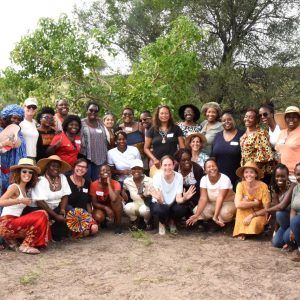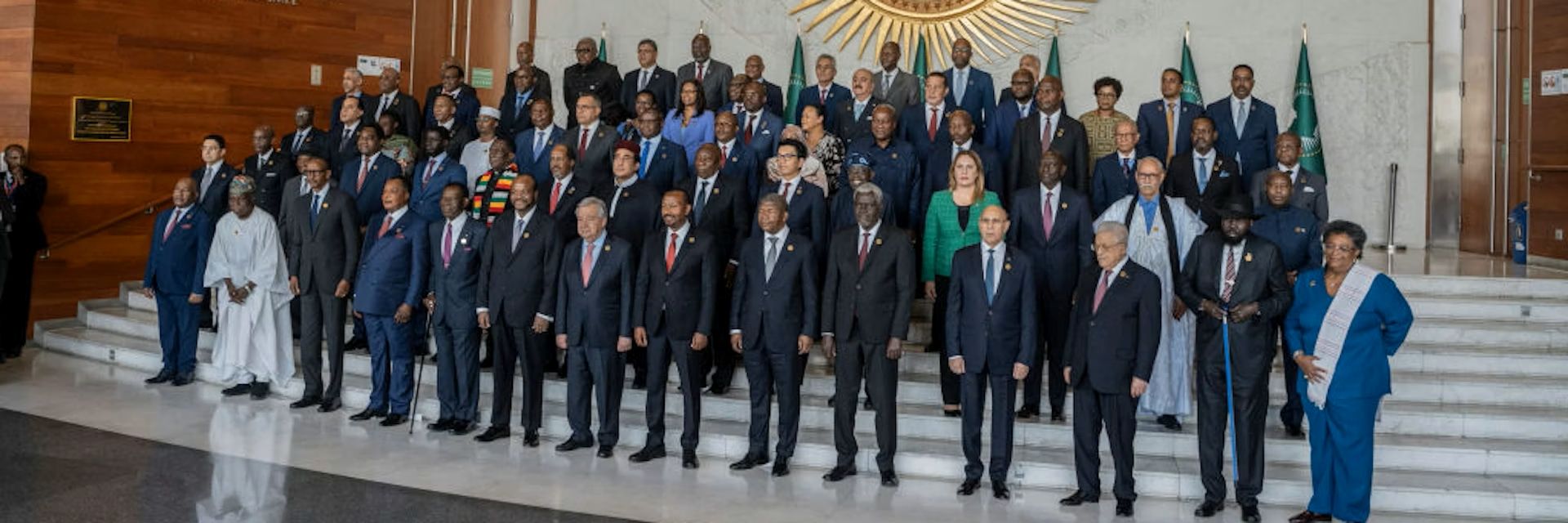"We are functioning in a system that was developed by men and for men; it's tough to push your agenda through when whole systems have been created to serve one gender", Dr. Colleen Begg.
In many parts of the world, women have, traditionally, been the custodians of biodiversity. Performing the bulk of work in agriculture, it is primarily women who plant the seeds, nurture the crops, and harvest the yield. When the wells run dry, it is the women who will trek long distances, in search of water, to avert the possibility of certain death in their families, and communities.
However, as with many other aspects of women's work and knowledge, their role in biodiversity conservation is considered non-work, and, therefore, non-knowledge. They are seldom invited, nor given the opportunity, to share their views on biodiversity conservation initiatives within the community.
Women are expected to do the work, but not make the decisions.
In Africa, they occupy less than 5% of the top positions at the decision-making level within the environmental conservation sector.
The few that are operating within the existing systems have to navigate structures that pay little heed to the unique contributions they make, or the obstacles they face working within the sector.
As with many other spheres of life, the lives of men have been taken to represent those of humans overall; the other half of humanity must conform.
One might say the system is broken, or perhaps it was just designed that way. Either way, this makes solving some of the world's biggest environmental challenges, as a woman, a near-impossible ask.
"I believe the gift of frustration is that it brings about change", Dr Leela Hazzah
With a combined experience of over 50 years in the environmental conservation sector, Dr. Colleen Begg and Dr. Leela Hazzah have pretty much seen all there is to see. And they've had enough.
The seasoned conservationists conceived the idea of a movement that would bring the sector's most underrated and undervalued player into the fold: The African woman.
To further understand their motivations, I had a conversation with Colleen and Leela:
"With the crises of loss of diversity and climate change, we are at a moment in time when courageous, compassionate leadership is urgently needed. We recognise that if we can have better leadership—leadership that is inclusive and diverse—we will create greater impact in our environmental work", Colleen explained.
"We believe that if we can empower the women at the top, they can empower the ones coming after them. There is a sense of urgency in what we are trying to achieve because when it comes to creating the necessary impact, we don't have the luxury of time", Leela added.
The subject of loneliness came up in our conversation. More than once. No surprises there. Operating as a minority in a system that was never designed to accommodate you will likely lead to feelings of loneliness.
But were they alone?
"When we started sharing our frustrations regarding the status quo, more and more women started coming out of the woodwork; this is a real problem", Leela said.
And there it was. Leela and Colleen were not alone in their frustrations. They had their work cut out.
A sisterhood is born
Women for the Environment Africa (WE Africa), the brainchild of Dr. Colleen Begg and Dr. Leela Hazzah, connotes both the collective nature and mission of the organisation. It is a movement, led by women, for the environment, and the people.
The 5-year program would, on an annual basis, take 20 female leaders working in the environmental conservation sector on the African continent through a leadership training program tailored to African women's experiences. It would include dialogues, one-on-one coaching and mentoring, storytelling, community building, peer support, and increased visibility for impact.
The program aims to change leadership norms that have stifled women for generations. Norms that have, ultimately, hindered progress in the environmental conservation sector.
To achieve this goal, a great deal of thought and care was put into selecting the coaches as well as partners that would hold space for the conversations that needed to be had. "Come as you are, get to know yourself better, and trust that your ability is enough", the women were told. Vulnerability, empathy and personal wellbeing are some of the 'never-go-there-as-a leader' topics that were addressed, head-on.
The activities carried out, connections built and resolutions made during the year-long program would eventually coalesce into a contagious movement led by African women who are creating change for themselves, their broader communities and shared environments.
As a storyteller, I had the privilege of peeking into the hearts and minds of the women from the program’s founding cohort. Our conversations took me to never-before-seen places, helping me to appreciate the fact that while business as usual is what got us here; it will not get us further.
The exclusionary, masculine leaning, heavily colonial foundations that have been the hallmarks of the conservation narrative on the African continent can weigh heavy, but these women understand their assignment and are equal to the challenge.
The women are coming. And they are coming as a collective.
The following excerpts, taken from my conversations with the founding cohort, embody these women's spirits as well as that of the WE Africa Movement:
“If something has to be resolved, no matter how uncomfortable, we will put it on the table, find a solution, and move forward", Tiana Andriamanana, Executive Director, Fanamby
“We are losing our wildlife because everyday decisions are made without compassion”, Dr. Winnie Kiiru, Founder of CHD Conservation Kenya & Director of Government Relations at Elephant Protection Initiative
“WE Africa has created a family of sisters who understand what I am going through because they have faced similar challenges and have surmounted them. I no longer feel alone in this journey”, Ruth Akagu, Small Grants Manager, BirdLife International, Africa Division
“As we expand (the organisation), we continue to include communities in our work, because we will never succeed if we don't have communities on board”, Rachel McRobb, Founder, Conservation South Luangwa
“When we want to push an agenda bigger than any one of us, I see how effective we can be”, Lucy Waruingi, Executive Director, African Conservation Centre.
“The patriarchy has built a lot of institutions, and when I walk into a room, I am likely to be the only woman or one of two. The expectation is that I should be cowed, but more and more, I've realised that actually, it's my power”, Zilanie Gondwe, Co-founder and Director of the Institute of the Conservation of Nature
“If you don't speak up, then you don't get seen”, Susan Waithaka, Country Relations Officer, Global Environment Facility
“In the conservation and environmental space, there are many instances where we have to make hard decisions. Sometimes they are taken into consideration; many times they are overlooked. But in the end, the truth always comes to light”, Sibongile Mavimbela, Senior Programme Officer for Environment and Climate Change, SADC.
“I strive to rectify power imbalances at all levels to bring about social justice (equity between people), environmental justice (equity in the costs and benefits of environmental and climate destruction) and ecological justice (giving nature the right to space)”, Melissa de Kock, Lead (Manager) of the Cross-cutting Conservation Team, WWF-Norway
“As it stands today, the only way you can be part of the (conservation)story is to be a hero of some sort. But we don't need heroes. Not in this story”, Resson Kantai Duff, Deputy Director, Ewaso Lions
“My PhD is for that woman in the village who couldn't go to school; if it can improve her livelihood, I will be happy”, Faith Muniale, Landscape Ecologist
“I am big on collective leadership. Interestingly, within conservation, egos are so high up on the agenda that even the way we do conservation is around flagship species instead of the ecosystem approach”, Aaniyah Omardien, Founder The Beach Co-op
“It's OK to be vulnerable as a leader. Because to be human is to be vulnerable”, Denise Okpala, Office Manager for Financial Reporting and Grants, ECOWAS
“In our (Ghanaian) culture, when the elders in the palace couldn't agree on an important issue, they would ask Abrewa, the elderly wise woman, to step in. She always had the solution. So right from those days, women had a special role to play in decision making”, Sheila Ashong, Environmental Management practitioner and UNESCO Biosphere Reserve Expert
“I now have a sisterhood of women who can support me as I help build hopes and possibilities for others. I also want to help dismantle the notion that this space is the preserve of white people or privileged people”, Samantha Atukunda, Lawyer, Executive Director, Greenwatch
“We are just human beings seeking love, peace, and joy. We will find that in nothing that humanity has created but in everything that already exists within ourselves — community, the land, caring for each other, slower paces, nurturing rather than competitive systems, unconditional, deep, boundless love. I like to call it a solidarity-based system”, Greta Francesca Iori, Wildlife Crime and Conservation Adviser
***





